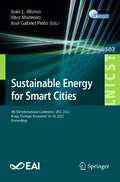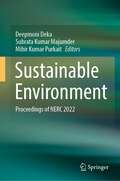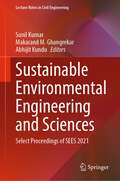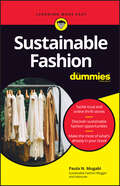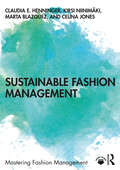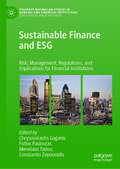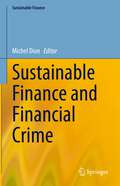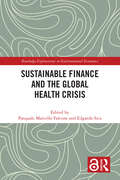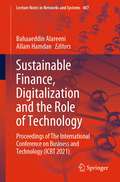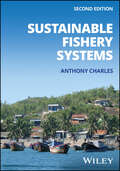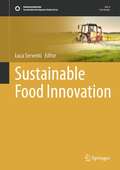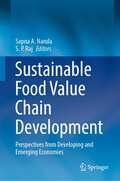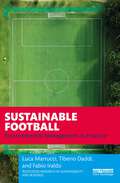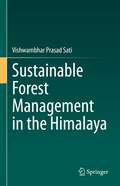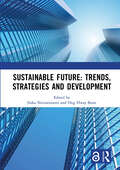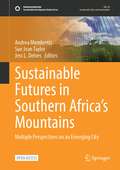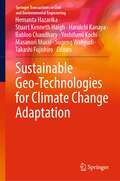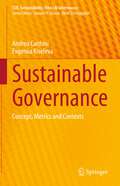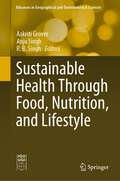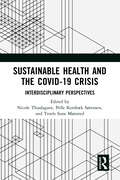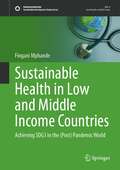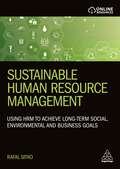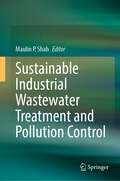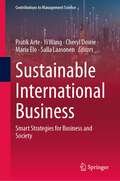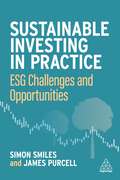- Table View
- List View
Sustainable Energy for Smart Cities: 4th EAI International Conference, SESC 2022, Braga, Portugal, November 16-18, 2022, Proceedings (Lecture Notes of the Institute for Computer Sciences, Social Informatics and Telecommunications Engineering #502)
by João L. Afonso José Gabriel Pinto Vitor MonteiroThis book constitutes the refereed post-conference proceedings of the 4th EAI International Conference on Sustainable Energy for Smart Cities, SESC 2022, held in Braga, Portugal, in November 2022. The 10 revised full papers were carefully reviewed and selected from 29 submissions. They present multidisciplinary scientific results toward answering complex technological problems of emergent Smart Cities. The subjects related to sustainable energy, framed with the scope of smart cities and addressed along with the SESC 2022 conference, are crucial to guarantee an equilibrium among economic growth and environmental sustainability, as well as to contribute to reducing the impact of climate change.
Sustainable Environment: Proceedings of NERC 2022
by Mihir Kumar Purkait Deepmoni Deka Subrata Kumar MajumderThis book covers topics that addresses the global environmental issues, their challenges, and mitigation strategies for sustainable development. Some of the major challenges global environment is facing currently are global warming induced climate change because of which various extreme weather events such as flood, drought, cyclone, forest fires have increased. Industrialization with urbanization and human anthropogenic activities have caused detrimental effect on the environment resulting in environmental pollution (air and water pollution), deforestation, degradation of ecosystems, soil erosion, ground water depletion, drinking water scarcity, biodiversity loss, depletion of fossil fuels, etc. Therefore, it has become utmost necessary to switch to significant lifestyle stages along with conservation of natural resources for a sustainable environment. Sustainable environment may be defined as the practice of responsibly managing natural resources and protect overall ecosystem to support health and well-being of present and future generations. One of the major environment sustainability is the use of renewable sources of energy such as solar, wind, hydroelectric, and biomass which will reduce environmental pollution and also minimize resource misuse. At the same time, crop rotation, solid waste management, water treatment, wastewater treatment are some of the sustainable practices we must carry out for a sustainable environment. Hope, the content of the book gives an overview of recent developments, knowledge gaps related to new research areas related to environment and their future prospects.
Sustainable Environmental Engineering and Sciences: Select Proceedings of SEES 2021 (Lecture Notes in Civil Engineering #323)
by Sunil Kumar Makarand M. Ghangrekar Abhijit KunduThis book presents the select proceedings of the International conference of Sustainability in Environmental Engineering and Science (SEES) 2021. It presents the latest developments in civil engineering that cover all aspects and challenges in civil engineering, environmental engineering and environmental science. Various topics covered in this book include construction and structural mechanics, building materials, concrete, steel and timber structures, geotechnical engineering, earthquake engineering, and coastal engineering. The volume will be useful for beginners, researchers, and professionals working in the areas of sustainable civil engineering and related fields.
Sustainable Fashion For Dummies
by Paula N. MugabiDitch fast fashion and create a more sustainable wardrobe Want to learn how to make more ethical fashion choices? Sustainable Fashion For Dummies will teach you how to pick up new habits that align with a more sustainable future. The rise of fast fashion in recent years has contributed to unsafe work environments, unfair wages, and toxic pollution. With sustainable fashion, you can have groovy clothing and accessories that are produced in an ecologically and socially responsible manner, using quality products and long-lasting materials. You don’t have to sacrifice your natural fashion sense—the sustainable fashion movement is responsible for some of the most exciting new trends. Pick up this easy-to-read handbook for practical tips and strategies on making more environmentally friendly fashion choices. Get started on your sustainable fashion journey Discover inexpensive options for making more eco-friendly fashion choices Make the most of what's already in your closet Master the art of thrift shoppingLet this Dummies guide be your guru as you start making socially and environmentally friendly fashion choices and becoming more thoughtful about what you purchase (or don’t purchase).
Sustainable Fashion Management (Mastering Fashion Management)
by Claudia E. Henninger Marta Blazquez Kirsi Niinimäki Celina JonesThis book provides a holistic and accessible approach to sustainable fashion management. It offers an interdisciplinary and practical outlook, combining theory with practical application from a management perspective and underpinned by the Sustainable Development Goals throughout. The book helps students to gain a better understanding of what sustainable fashion is and how it is implemented across the fashion industry, through business model innovations, innovative designs, new technology and digital approaches, and material innovations. Global case studies are employed throughout each chapter, including fashion companies and events of all sizes, alongside other pedagogical features to aid learning, including key learning points, chapter objectives, and textboxes explaining key terminology. This is an essential textbook for those investigating sustainable fashion, whether from a design or management perspective, providing the knowledge and tools for a future career. It is designed to serve Fashion Business and Management, Fashion Marketing, Fashion Buying and Merchandising and Fashion Technology courses, at all levels, and will also be valuable reading for those already working within the fashion industry and studying for professional qualifications. Online resources include chapter-by-chapter PowerPoint slides and a test bank.
Sustainable Finance and ESG: Risk, Management, Regulations, and Implications for Financial Institutions (Palgrave Macmillan Studies in Banking and Financial Institutions)
by Constantin Zopounidis Fotios Pasiouras Chrysovalantis Gaganis Menelaos TasiouIn recent years sustainable finance along with Environmental, Social and Governance (ESG) aspects and their implications for financial institutions have attracted the attention of academics and policy makers. The aim of the book is to bring together chapters that discuss the most recent empirical and theoretical evidence in the field, along with policy making and regulatory initiatives. The book covers topics such as the changing role of banks in the financial system, the differences between sustainable banks and traditional banks, ESG and financial performance, bank social responsibility and customer satisfaction, ESG risk management of financial institutions, the politics of climate finance and policy initiatives, and the role of bank regulators. It will be of interest to academics and policymakers working in banking, risk management, sustainable finance and related fields.
Sustainable Finance and Financial Crime (Sustainable Finance)
by Michel DionSustainable finance is a holistic approach to the sustainability development goals (SDG), so that the interdependence between environmental, social, and governance issues is unveiled. Sustainable finance takes into account the various challenges following from social change and sustainability, the evolution of capital markets, and the development of efficient risk management practices. Governance issues are an integral part of sustainable finance. However, academic literature has generally neglected to consider strategies to prevent and fight financial crimes as a crucial component of sustainable finance. The aim of this book is to focus on the interconnectedness between sustainable finance and preventing/fighting financial crime, not only as a crucial governance issue, but also as a deep challenge for social and even environmental issues. There is no really sustainable finance without developing strong and efficient means to fight financial crimes.
Sustainable Finance and the Global Health Crisis (Routledge Explorations in Environmental Economics)
by Edgardo Sica Pasquale Marcello FalconeThe speed with which the various economies recover from the Covid-19 pandemic will significantly determine the economic pressure placed on the environment in the medium to long-term. Furthermore, the pandemic has highlighted the strong interrelations between natural and societal systems, with societal resilience depending on a resilient environmental support system. In this context, this book argues that the pandemic represents a wake-up call for financial systems to be better prepared for the climate crisis and social risk and has provided a stimulus to scale down the reliance of the global economy on fossil fuels. The first part of the book provides a deep and creative discussion between leading international researchers and experts on the policy options and financial instruments which can help to catalyze the green finance transition in the post Covid-19 era. The contributions here show that sustainable finance is emerging as a powerful tool to catalyze the transition towards a more environmentally and socially sustainable economic model. Instruments such as sovereign green bonds, green securities, and other sustainability-related securities can play a significant role in the post Covid-19 world to fund economic stimulus and to lead the way to new and more sustainable future. The second part of the book supports the debate by highlighting a number of selected case studies on financing transitions in different regional contexts including Africa, Asia, Europe , and Latin America. This book marks a significant contribution to the literature on environmental economics and finance, climate change and sustainability transitions.
Sustainable Finance, Digitalization and the Role of Technology: Proceedings of The International Conference on Business and Technology (ICBT 2021) (Lecture Notes in Networks and Systems #487)
by Allam Hamdan Bahaaeddin AlareeniThis book constitutes the refereed proceedings of the International Conference on Business and Technology (ICBT2021) organized by EuroMid Academy of Business & Technology (EMABT), held in Istanbul, between 06–07 November 2021. In response to the call for papers for ICBT2021, 485 papers were submitted for presentation and inclusion in the proceedings of the conference. After a careful blind refereeing process, 292 papers were selected for inclusion in the conference proceedings from forty countries. Each of these chapters was evaluated through an editorial board, and each chapter was passed through a double-blind peer-review process.The book highlights a range of topics in the fields of technology, entrepreneurship, business administration, accounting, and economics that can contribute to business development in countries, such as learning machines, artificial intelligence, big data, deep learning, game-based learning, management information system, accounting information system, knowledge management, entrepreneurship, and social enterprise, corporate social responsibility and sustainability, business policy and strategic management, international management and organizations, organizational behavior and HRM, operations management and logistics research, controversial issues in management and organizations, turnaround, corporate entrepreneurship, innovation, legal issues, business ethics, and firm governance, managerial accounting and firm financial affairs, non-traditional research, and creative methodologies.These proceedings are reflecting quality research contributing theoretical and practical implications, for those who are wise to apply the technology within any business sector. It is our hope that the contribution of this book proceedings will be of the academic level which even decision-makers in the various economic and executive-level will get to appreciate.
Sustainable Fishery Systems
by Anthony CharlesSUSTAINABLE FISHERY SYSTEMS An up-to-date and interdisciplinary guide to sustainable fisheries Fisheries, whether small-scale or large-scale, are filled with complexity and uncertainty. Making the right decisions to successfully manage fisheries for sustainability and resilience requires a systems approach — including both natural and human elements, and their many interactions. To understand fisheries, and how they change over time, a diverse range of fishery knowledge must be brought together. Sustainable Fishery Systems, 2nd edition meets these needs. The new edition provides essential information that can be readily applied within government, community, industrial, academic and research settings. Sustainable Fishery Systems, 2nd edition retains the first edition’s emphasis on themes such as sustainability, resilience, uncertainty, complexity, and conflict, and expands its treatment of topics that have, since the first edition’s publication, become crucial to consider in the field of fisheries. As a result, readers will find: Updated and expanded coverage of topics including coastal conservation, ecosystem-based management, co-management, community-based management, and more New chapters covering connections between fisheries and marine protected areas, biodiversity conservation, climate and fisheries, and multi-sectoral management A more detailed introduction to the “systems” perspective of fisheries, reflecting the substantial growth in that subject’s importance, and covering in detail the natural, human and governance aspects of fisheries. Sustainable Fishery Systems, 2nd edition is an indispensable interdisciplinary resource for educators, researchers, government agencies, and fisheries managers.
Sustainable Food Innovation (Sustainable Development Goals Series)
by Luca ServentiThis text offers a holistic approach to the two topics of the highest interest in the current and future food industry: sustainability and nutrition. The current knowledge is narrow and specific to individual topics focusing on either one nutrient or one discipline. Food is part of a wide circle of disciplines: nutrition, technology, sensory, environmental aspects, psychology, economy, culture and society. In the recent years, the sales of innovative foods such as meatless burgers, allergen-free products and personalized nutrition have skyrocketed. Sustainable Food Innovation presents the big picture on each nutrient: industrial and natural sources (ingredients, food products), consumer acceptability (price, sensory quality) and nutritional properties (quantity and quality) with each chapter focusing on a specific essential nutrient. Further chapters illustrate the role of other elements of interest such as bioactive. In addition, experimental data is added to enrich the book. Online discussions on current food trends are analyzed and presented to the reader in the effort to understand consumers’ psychology. This will be the first publication to combine literature review and research data and the first to offer a comprehensive discussion on sustainable food innovation. The ultimate goal is to educate consumers and experts, providing technical and socioeconomic knowledge in a multidisciplinary context. Ultimately, informed technologists will develop healthier, sustainable food products and informed consumers will make informed decisions on nutrition and food choices.
Sustainable Food Value Chain Development: Perspectives from Developing and Emerging Economies
by Sapna A. Narula S. P. RajThe book addresses the gap that exists in sustainable value chain development in the context of developing and emerging economies in meeting the sustainable development goals. The book adopts a holistic approach and discusses significant aspects of the topic such as challenges, opportunities, best practices, technology and innovation, business models, and policy formulation. The chapters focus on all the existing and potential actors in the value chain. Comprising invited chapters from leading researchers, policymakers, practitioners, and academicians working on this topic, this edited book is useful for scientists, researchers, students, research scholars, and practitioners as it builds the latest interdisciplinary knowledge in the area. An important aspect of the book is the case studies of already ongoing projects from various emerging economies around the world. Contributions are divided into four sections—sustainable food systems and circular economy: tackling resource use, efficiency, food loss, and waste problems; technology and innovation for food value chain development; toward responsible food consumption; linking small farmers to markets: markets, institutions, and trade. Significantly, the book is organized in the context of Sustainable Development Goals and has direct relevance and linkages with SDG 1 (poverty alleviation), SDG 2 (zero hunger), SDG 3 (good health and well-being), SDG 4 (quality education), SDG 5 (gender equality), SDG 12 (responsible consumption and production), SDG 13 (climate action), and SDG 17 (partnerships).
Sustainable Football: Environmental Management in Practice (Routledge Research in Sustainability and Business)
by Tiberio Daddi Fabio Iraldo Luca MarrucciThis book provides a comprehensive, up-to-date overview of the different environmental strategies adopted in the football world to foster sustainability. The authors lay out useful insights, both for scholars and practitioners, to improve good governance in football organisations by empowering environmental organisational and operational actions. As well as examining practical methods of implementing green initiatives, the book discusses their added value from different perspectives including football fans, football managers and policymakers. By identifying the most important green actions for the dissemination of environmentally friendly behaviours at both individual and organisational levels, the book demonstrates how football organisations can use operational and organisational methods to develop an environmental sustainability strategy. The book contributes to developing the role of the football world by covering different facets of sustainability such as the circular economy, climate change, green marketing, fans engagement and more. It will be a valuable resource for scholars and students of environmental management, sustainable business and corporate social responsibility, as well as professionals working in the football industry.
Sustainable Forest Management in the Himalaya
by Vishwambhar Prasad SatiThis volume presents a comprehensive description of forests of the Uttarakhand Himalaya. It looks into the major drivers of forest depletion and suggests paths toward sustainable forest management. The book comprises thirteen chapters, which together describe forest land use/cover change; forest classification and working circles; national parks, wildlife sanctuaries, and conservation reserves; forest diversity and distribution; forest stocks and products; ecosystem goods and services; environmental index; drivers of forest degradation and conservation; climate change and forests; cultural and economic significance of forests, and sustainable forest management. The text is richly complemented by nearly seventy photographs and figures.
Sustainable Future: Proceedings of the 3rd Conference on Managing Digital Industry, Technology and Entrepreneurship, (CoMDITE 2022), Bandung, Indonesia, 24 May 2022
by Siska Noviaristanti Ong Hway BoonThe book contains a selection of papers that were presented at the 3rd Conference in Managing Digital Industry, Technology and Entrepreneurship (3rd CoMDITE) with the theme: Sustainable Future: Trends, Strategies and Development. The Millennium Development Goals, continued as Sustainability Development Goals (SDGs), are effective instruments and have, in recent years, brought many positive changes in numerous countries around the world. Most notably, it has fundamentally changed our way of approaching the tangled set of challenges: States today undertake to achieve concrete development goals; transparency and accountability to citizens and the global public has become a matter of course; and cooperation between the political, economic and societal spheres is no longer questioned. However, in addition to the global pandemic situation it has challenged the business world to develop an outstanding strategy to face extreme uncertainty. Using digital technology and its advancement is believed to be one of the main keys for taking up this challenge.The 3rd Conference in Managing Digital Industry, Technology and Entrepreneurship (the 3rd CoMDITE) has brought forward discussions on implementation of digital technology in strategic, operation, finance, marketing, human resources management, and entrepreneurship around sustainable future issues.The Open Access version of this book, available at http://www.taylorfrancis.com, has been made available under a Creative Commons Attribution-Non Commercial-No Derivatives (CC-BY-NC-ND) 4.0 license. Funded by Telkom University, Indonesia.
Sustainable Futures in Southern Africa’s Mountains: Multiple Perspectives On An Emerging City (Sustainable Development Goals Series)
by Andrea Membretti Sue Jean Taylor Jess L. DelvesThis open access book presents multiple disciplinary perspectives on the challenges and opportunities for sustainable development in the South African mountain city of Phuthaditjhaba. These challenges are embedded in the complex environmental, socio-cultural and political contexts of the region. Established as the capital of the QwaQwa ‘homeland’ under Grand Apartheid, this city is now home to between 400,000 – 700,000 people but in many areas lacks formal infrastructure and services. Each chapter of this volume addresses a different aspect of the city’s development and all take the UN Sustainable Development Goals as a common framework to guide their reflections on potential sustainable futures for Phuthaditjhaba. While the circumstances in Phuthaditjhaba will be familiar to many researchers of informal and growing cities in developing regions, the mountain setting of the city brings its own set of challenges and opportunities linked to the rugged and steep terrain, remoteness and natural resources. This book serves to showcase the diverse research taking place in this emerging mountain city and provide reflections on how a sustainable future can be ensured for its environment and inhabitants.
Sustainable Geo-Technologies for Climate Change Adaptation (Springer Transactions in Civil and Environmental Engineering)
by Hemanta Hazarika Stuart Kenneth Haigh Haruichi Kanaya Babloo Chaudhary Yoshifumi Kochi Masanori Murai Sugeng Wahyudi Takashi FujishiroThis edited volume is a compilation of peer-reviewed papers of the plenary lectures, keynote lectures, special lectures and young researcher’s special lectures delivered at the 1st International Symposium on Construction Resources for Environmentally Sustainable Technologies (CREST 2020) organized by Kyushu University, Fukuoka, Japan. The book focuses on sustainability, promotion of new ideas and innovations in design, construction and maintenance of geotechnical structures with the aim of contributing towards climate change adaptation and disaster resiliency to meet the UN Sustainable Development Goals (SDGs). It presents latest research, information, technological advancement, practical challenges encountered, and solutions adopted in the field of geotechnical engineering for sustainable infrastructure towards climate change adaptation. This volume will be of interest to those in academia and industry alike.
Sustainable Governance: Concept, Metrics and Contexts (CSR, Sustainability, Ethics & Governance)
by Andrea Cardoni Evgeniia KiselevaThe role of governance as a fundamental pillar of sustainability is widely recognized and confirmed by its inclusion in the main ESG issues (environmental social governance). Through the complex role of governance in the context of ESG, research has developed the notion of sustainable corporate governance, i.e., a system based on the integration of shareholder and stakeholder objectives that protects the environment and the broader community. This book provides a sound theoretical definition, a precise measurement system, and best practice examples for the implementation of sustainable corporate governance. It includes theoretical foundations based on stakeholder and institutional theories from different environments and contexts, such as developed and developing economies, large publicly traded companies and SMEs, and family businesses. In addition to explaining the concept theoretically, it uses practical case studies to address the effective integration of sustainable governance into corporate structures. The book provides business students and researchers with an in-depth analysis of the emerging concept of sustainable governance and is valuable for academics as well as corporate and financial market participants.
Sustainable Health Through Food, Nutrition, and Lifestyle (Advances in Geographical and Environmental Sciences)
by R. B. Singh Aakriti Grover Anju SinghThis book uncovers the multiple layers of challenges posed to achieve sustainable human health and improves the understanding of interactive areas set by the UN Sustainable Development Goals (1) no poverty, (2) zero hunger, (3) good health and wellbeing, (6) clean water and sanitation, and (11) sustainable cities and communities. The book focuses on conceptual understanding, food, nutrition, lifestyle, and their integration to reinforce the ideas of holistic health principles.' The most important drivers of sustainable health are food, nutrition, and lifestyle. Healthy food is a basic need of human beings. In under-developed regions, people are underweight and facing malnutrition, with a prevalence of deficiency diseases due to low intake of micro-nutrients such as vitamin A, iodine, and protein among others. A good diet as well as lifestyle has a tremendous bearing on a person’s health, emotional stability, and enthusiasm for life. The global coronavirus pandemic has brought unimaginable devastation and hardship in all corners of the globe, questioning the existing healthcare services, health policies, and health planning across the developed and developing countries. It has also exposed the lacunae in understanding health, the base of human happiness. The global community needs to gravely ponder the health issues we are facing and explore sustainable solutions for health recovery and the wellbeing of humanity.
Sustainable Health and the Covid-19 Crisis: Interdisciplinary Perspectives
by Nicole Thualagant Pelle Korsbæk Sørensen Troels Sune MønstedThis edited collection offers interdisciplinary perspectives on some of the key health challenges faced by individuals, communities, and governments during the COVID-19 pandemic. Taking the Danish context as a starting point, it extrapolates to discuss the international relevance of a range of issues. The book contains 4 parts: · Part 1 looks at the societal reactions to COVID-19, discussing issues around health communication, legitimacy, ethics, and bio-politics. · Part 2 approaches the health and well-being of specific groups during the crisis. · Part 3 assesses how the crisis stimulated sustainable solutions to key problems, from digital methods for delivery of healthcare, to changes to the food supply chain. · Part 4 looks broadly at how historical developments in the study of epidemiology and current scientific perspectives enable the understanding and, to some extent, management of the COVID-19 pandemic. With contributions from scholars across the social sciences, health sciences, and humanities, each chapter provides not only insight into a particular issue, but also the theories and scientific methods applied to understand and overcome the COVID-19 crisis. It will be important reading for both scholars and policy makers, informing an appropriate response to future health crises.
Sustainable Health in Low and Middle Income Countries: Achieving SDG3 in the (Post) Pandemic World (Sustainable Development Goals Series)
by Fingani MphandeThis book highlights lessons from the COVID-19 pandemic and explains how these can be used to build sustainable health systems, especially in Low- and Middle-Income Countries (LMIC). It investigates the impact of outbreak response and management on health sustainability in LMIC from the perspective of SDG3: “Ensuring healthy lives and wellbeing for all at all ages”. Despite strides being made in some areas for SDG target 3.3 to fight communicable diseases, the COVID-19 pandemic has caused interruptions that will considerably affect vaccination coverage as well as the progress that was made, for example: in reducing malaria cases. Vulnerable populations who were already struggling to access their healthcare needs before the pandemic may face even greater challenges at present and in the years to come, post-pandemic. This book considers the progress on attaining the SDG3 targets, specifically: to improve early warning systems for management of national and global health risks, and the effect of pandemics - including but not limited to the COVID-19 pandemic - and emerging disease outbreaks. It explores the weaknesses and strengths in LMIC and how to strengthen capacities in these countries. The author also investigates and proposes approaches that can, or should, be implemented to ensure sustainable health systems in developing countries, including early warning systems, risk reduction, and the management of global and national health risks. This book is of great interest to public health professionals, infectious diseases experts, and epidemiologists, as well as students and researchers of public health systems and healthcare infrastructure in developing countries.
Sustainable Human Resource Management: Using HRM to achieve long-term social, environmental and business goals
by Dr Rafal SitkoSustainable human resource management (HRM) processes and practices are not a nice-to-have, they're a need-to-have to benefit employees, organizations, societies and the environment. Sustainability has been highlighted by the Chartered Institute of Personnel and Development (CIPD) as one of the key trends influencing the HR profession so Sustainable Human Resource Management is crucial reading for undergraduate and postgraduate HR students. It explains what sustainable HRM is, what the benefits of sustainable HRM are as well as the dangers of unsustainable HRM. It is full of examples throughout to show how sustainable HRM works in practice including how it can be used to improve candidate attraction, retention and employee engagement as well as how it can improve productivity, employer branding, company culture and drive both efficiency and business performance. There is also coverage of how sustainable HRM can be introduced and measured as well as specific guidance on sustainable HRM in different parts of the world, green HRM, responsible business, ethics and sustainable HRM as a business strategy. Sustainable Human Resource Management is written specifically for third year undergraduate and postgraduate students with pedagogical features in each chapter including learning objectives, key concept definitions, skill check boxes, workshop discussion articles, chapter summaries, study questions and key readings. Online resources include a sample course handbook and PowerPoint slides.
Sustainable Industrial Wastewater Treatment and Pollution Control
by Maulin P. ShahThis book summarizes the advanced sustainable trends in removing toxic pollutants by environmental and biotechnological processes from both industrial wastewater and sewage wastewater. The book also provides an assessment of the potential application of several existing wastewater bioremediation techniques and introduces new cutting-edge technologies. Among other valuable information covered, here are the methods, procedures, materials (especially low-cost materials originating from industrial and agricultural waste), management of wastewater containing toxic pollutants, and valorization possibilities of waste resulting from the removal of toxic pollutants from wastewater.Tonnes of hazardous waste pollutants released by industries are a challenge worldwide. With the ever-growing population and shrinking landfill areas, managing the disposal of pollutants is a matter of severe concern. Industrial wastewater treatment, recycling, and reuse are serious issues in today’s context, not just to protect the environment from pollution, but also to conserve water resources so that water stress is reduced.This book is designed for engineers, scientists, and other professionals and serves as a good summary of the current state-of-the-art and innovative research challenges to control pollution for coming generations.
Sustainable International Business: Smart Strategies for Business and Society (Contributions to Management Science)
by Yi Wang Maria Elo Pratik Arte Cheryl Dowie Salla LaasonenThis is a unique book that adopts a global approach to studying international business. It stimulates research and rethinking among scholars and practitioners to understand how businesses operate internationally into lucrative markets, and their role in sustainable business growth, glocal value creation, and economic development. It provides insights into how international firms, entrepreneurs, family businesses, and other stakeholders balance the act of value creation and conducting sustainable and ethical business. The book covers economic, social, and environmental dimensions of sustainability such as poverty alleviation through FDI and remittances, diversity and inclusion in management, and ethical governance to value creation for stakeholders and profit maximization through sustainable firm growth, entrepreneurial initiatives, and sustainable business models. It addresses capacity building and the grand challenges that international business needs to develop solutions for. The chapters offer multiple types of contributions including conceptual and theoretical works, literature reviews, and empirical (qualitative and quantitative) studies. The authors, and the topics included, provide a wide international representation and illustrate multi-layered sustainable business perspectives that cover developing, emerging, and developed country contexts as well as multiple directions of international business flows.
Sustainable Investing in Practice: ESG Challenges and Opportunities
by Dr Simon Smiles James PurcellThe compelling promise of progressing profits, purpose and the planet is what drives sustainable investing. Yet the field is also packed with challenges and pitfalls for the finance industry.Sustainable Investing in Practice provides a pragmatic steer for how finance professionals can navigate the realities of ESG investing so they can achieve the impact they desire. It addresses the obvious problems - a lack of common standards, opaque vocabulary, irrelevant data - that investors face. And it explains the skewed incentives and compromises that have held sustainable investing back. Yet it does not dwell on obstacles and defeat. Instead, it shows readers how to develop sustainable strategies and improve outcomes, covering critical topics such as ESG ratings, data and disclosure policies and multi-asset portfolios, while also documenting successful practices and pointing out how to modify inadequate ones. Packed full of insightful examples, analysis and interviews from expert commentators such as Paul Polman KBE, Richard Curtis OBE, and Gillian Tett, the book provides useful ideas and plans for how to take sustainable finance forward while balancing credibility and commerciality in equal measure. Written by two pioneering leaders within sustainable investing, this is a must-read for every finance professional, investor and regulator-whether they are seeking to fast track their careers, bring commercial and sustainable learning to their organization, or upgrade their understanding of this crucial but complex topic. It will also be of interest to students taking modules on sustainable finance.
